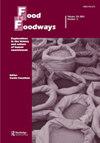文人汤:宋代饮食思想与社会秩序
IF 1.1
Q2 ANTHROPOLOGY
引用次数: 0
摘要
摘要本文探讨了宋代(960–1279)中国知识分子所阐述的饮食话语,并提出了关于其社会功能的假说。从布迪厄的观点出发,即不同的消费方式支持不同的社会秩序观,我首先定义了奢侈饮食,并描述了它在宋代的社会扩散。然后,我记录并分析了节俭的饮食意识形态,其特点是强调简单的烹饪和自然,以及一种我称之为“享乐主义”的受控享乐主义。最后,我对这种饮食意识形态进行了社会学解释,我认为这是宋代知识分子文化资本的一种表达:学者们委婉地反对奢侈饮食及其所代表的社会秩序的“时间”(即经济资本主导)愿景;通过节俭的意识形态,他们支持了另一种“精神”社会愿景,在这种愿景中,地位建立在文化而非财富的基础上。本文章由计算机程序翻译,如有差异,请以英文原文为准。
The soup of the scholar: food ideology and social order in Song China
Abstract This essay explores the food discourse elaborated by Chinese intellectuals in the Song period (960–1279) and puts forward a hypothesis concerning its social function. Starting from the Bourdieusian idea that different consumption styles support different visions of the social order, I first define luxurious eating and describe its social diffusion in Song. I then document and analyze the food ideology of frugality, characterized by an emphasis on simple cooking and naturalness as well as by a form of controlled hedonism which I call “Epicurean.” Finally, I offer a sociological interpretation of this food ideology, which I understand as an expression of Song intellectuals’ cultural capital: the scholars euphemistically took position against luxurious eating and the “temporal” (i.e. economic capital dominated) vision of the social order it signified; through the ideology of frugality, they supported an alternative, “spiritual” vision of society in which status is based on culture rather than wealth.
求助全文
通过发布文献求助,成功后即可免费获取论文全文。
去求助
来源期刊

Food and Foodways
ANTHROPOLOGY-
CiteScore
2.20
自引率
0.00%
发文量
16
期刊介绍:
Food and Foodways is a refereed, interdisciplinary, and international journal devoted to publishing original scholarly articles on the history and culture of human nourishment. By reflecting on the role food plays in human relations, this unique journal explores the powerful but often subtle ways in which food has shaped, and shapes, our lives socially, economically, politically, mentally, nutritionally, and morally. Because food is a pervasive social phenomenon, it cannot be approached by any one discipline. We encourage articles that engage dialogue, debate, and exchange across disciplines.
 求助内容:
求助内容: 应助结果提醒方式:
应助结果提醒方式:


